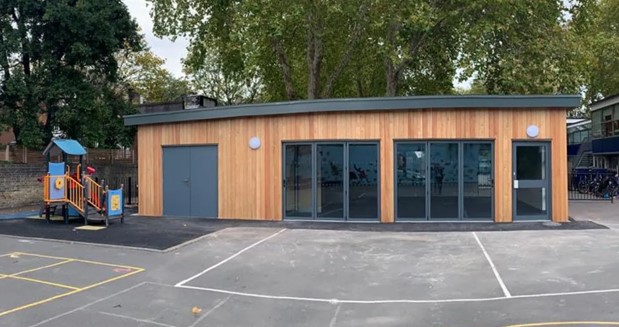In a world where children dream of fun camping trips and exciting days at the pool, why not infuse their educational journey with a dose of creativity and flexibility? In the ever-evolving landscape of education, innovation is the key to unlocking brighter futures for our students. Modular classrooms stand out as the optimal learning environments that foster growth, adaptability, and collaboration.
Gone are the days of traditional brick-and-mortar structures that limit educational possibilities. From elementary schools to universities, many educators nowadays turn to flexible and sustainable modular classroom building. Whether you’re tired of the same old classroom routine or just someone who’s fascinated by the blend of architecture and education, these structures are worth checking out. Thanks to the durable materials and high-quality construction, they can handle the wear and tear of everyday school life with ease.
Fast Construction
Regular construction is such a pain – the noise, the dust, the never-ending wait. Well, with modular classrooms, all those headaches disappear. These structures are prefabricated off-site, which means while the building’s being built, your school life remains nice and peaceful. No more dodging construction zones on your way to class! And once they’re done with the construction, they deliver them to your school ready to go. It’s like a huge puzzle that’s already been put together! You don’t have to wait months and months for the building’s completion.
So, how fast can you build a modular classroom? You can have a brand-new structure up and running in just over two months! No more waiting around for ages, dealing with construction delays, and counting the days. So, whether your school needs to accommodate a growing student population or wants to create a flexible space for different activities, modular is the answer!
Cost-Effective
Traditional construction can be a money drain. From hefty material costs to never-ending labour fees, it often leaves schools scratching their heads and digging deep into their pockets. But with modular classrooms, it’s a whole different ballgame. They build these structures in a controlled environment, which means less waste and more savings. And since they’re built in record time, you save on labour costs. Less time on-site means less money spent on construction workers.
With these buildings, you can avoid the headache of unexpected expenses that often pop up in traditional construction, such as surprise repairs or delays that can send the budget skyrocketing. Their streamlined process keeps things predictable and budget friendly. So, whether you’re on a tight budget or a savvy spender who loves getting more bang for your buck, these classrooms are the answer. You don’t have to break the bank to create a top-notch learning environment!
Sustainable
Eco classrooms are built with sustainability in mind, using sustainable materials and energy-efficient features. Since the construction happens off-site, they produce way less waste than traditional construction. The manufacturer carefully selects the materials to minimize their impact on the environment.
A modular classroom building will also reduce energy consumption. With proper insulation and ventilation, they keep the temperature just right without overloading the AC. That means lower energy bills and less strain on the planet. Modular structures are like the eco-warriors that come to the rescue. They’re built to last, so they reduce the need for constant repairs and replacements. This way you’re investing in a sustainable future for generations to come!
Minimal Disruption
With modular buildings, the noise, the dust, and the blocked pathways that drive everyone crazy are a thing of the past! Since they’re built off-site, all that noisy construction stuff happens far away from your school. It’s like the construction zone is in a secret location, away from all the daily hustle and bustle. So, your students can continue learning and your teachers can continue teaching, without any interruptions. And when they’re ready, they just deliver the completed structure right to your school. No more waiting for months and months for a building to rise from the ground.
The assembly process is super quick and efficient. It’s like a well-coordinated dance – they bring in the pieces, fit them together like a jigsaw puzzle, and before you know it, your brand-new classroom is ready to roll. Say goodbye to blocked paths and detours that can feel like a maze. With modular classroom buildings, it’s smooth sailing all the way!
Customisation
Every school is unique and has different needs. This is why you need a super flexible structure, so you can customise it to fit your school’s personality and requirements. From the layout to the colour scheme, it’s all in your hands. You can go wild with your creativity and create a space that reflects your school’s vibe and values. You can choose the number of rooms, the size of each one, and even the configuration – it’s like building your own educational paradise!
Want big windows to flood the classroom with natural light? You got it. Fancy a cool outdoor deck for some fresh air learning? No problem. The possibilities are practically endless! Plus, the manufacturers understand that schools change over time. Maybe you need to expand in the future or reconfigure the rooms for a different purpose – not a big deal for modular structures. They’re the shape-shifting transformers of education!
Mobility
Sometimes schools are expanding, relocating, or just trying to keep up with the changing educational landscape. If your school needs to move to a new location, modular classrooms are your trusty sidekick, ready to pack up and hit the road. It’s like having a portable structure that you can take wherever you go!
And this mobility doesn’t mean you’re compromising on quality. These structures are built to the same standards as traditional buildings, so you’re getting durability, comfort, and flexibility all rolled into one. The mobility also means you can repurpose these classrooms. Need a new science lab or an art studio? No problem! It’s like having a classroom that’s always up for a makeover, no contractor needed.
Bottom Line
From their rapid construction that saves time and reduces disruptions to their cost-effectiveness eases the burden on school budgets, these modular classrooms have proven to be a game-changer. Their flexibility and customizability empower schools to create learning spaces that reflect their unique vision and adapt to ever-changing educational needs. Moreover, their sustainable design showcases a commitment to both student growth and environmental responsibility. These buildings embrace innovation and pave the way for a brighter future in education!
Read Also:
- Enhancing Nursing Education: A Detailed Guide To Performing Head-To-Toe Assessments With Goreact
- Creating Educational Materials? Find Out Why Foreign Language Versions Are Essential
- SAP Hana Training Courses And Their Importance In IT Industry
























